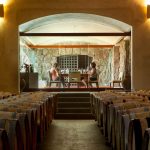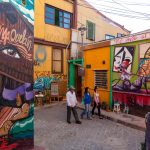Doing a guided tasting with Derek Mossman, Canadian and part owner of Garage Wine Co., is dissimilar to any other you’re likely to experience. As he and his team buck the trends of conservative winemaking in Chile, he’d like you to drop some of your assumptions about wine as well. For Upscape’s clients, Derek does tastings at a local restaurant of several different wines, including his own, though he might not tell you which are his until the very end.
That’s because even though he’s one of the three-person team that heads up the winemaking—which formerly actually took place in his garage—he’s not trying to sell you specifically on his own wine. And unlike many winemakers, he thinks you know more about what you like to drink than he does. So while he can guide you, and help you to find wines you like, he’s not interested in the top-down approach to wine in which he tells you which wines are good.
Wine Tastings with Derek
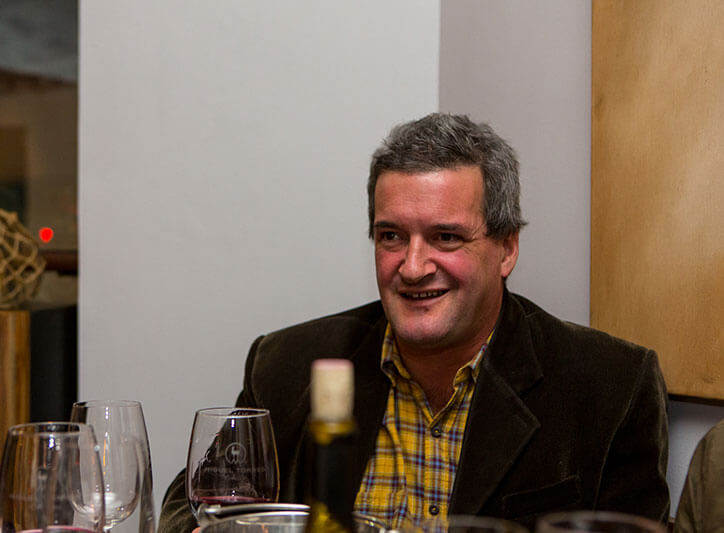
Derek Mossman, Garage Wine Co. winemaker
Tastings with Derek will usually compare and contrast wines from his and other local producers, maybe one varietal from three different years, or maybe a vertical of different vintages of the same label. As often as not, these wines may come from wine labels that, like Garage Wine Co., are part of MOVI, Chile’s Movement of Independent Winemakers, comprised of 28 small producers, of which Derek is one of the unofficial spokesmen.
Derek wants visitors, who he suspects will leave as friends, to leave with a curiosity, he refers to as a “bug under their skin,” an interest in and an approach to wine that may differ from the one they came with. He welcomes all kinds of questions. “I like it when people ask you about specific wine, why I like this style, for example,” though he says no question is too simple or too technical. He welcomes them all, because what he really wants, in addition to taste wine with you, is to open a discussion about wine.
“When Brian’s people [Upscape guests] come, I like to give them two of each wine, two Cabernet Francs, two Cabernet Sauvignons, two Maulinos (wines from the Maule region). It’s not that one is better than the other, it’s that they’re different, you could like either.”
And what do guest do with that information? That’s when Derek likes to get the debate going, saying, “it’s fun to kind of divide them into groups,” according to who likes which wine.
And don’t think he expects you to be up to date on identifying the accepted wine aromas in the Nez du Vin (though he won’t judge you if you do). At a recent tasting at the Santiago-based wine store Vinomio, he anthropomorphized the wines a bit to get his point across. He called one broad shouldered, another as showing a lot of cleavage. When I asked him if he always uses body types, he says “No, maybe it was just the crowd today.” Just like he doesn’t want people he receives at tastings to get stuck on that the idea that one kind of wine is the right one, he won’t be limited to one set of descriptions. One day it’s body types, another day, cars, or even colors. It could, for example, just as easily be music.
For example, he says, “many of us are used to drinking tight wines, with little risk.” But at his tastings he wants to take you through different kinds of wines, ones he describes as having “good rhythm, like jazz. They can break syncopation, go into the middle eight.” [When you’re tasting these wines, it’s] like you’re pursuing something, like you’re improvising,” he says, referring back to jazz musicians.
A lot of his ideas of how to host a tasting have to do with bringing people, even experienced tasters, closer to wine, he says. “People shouldn’t feel anxious about what they’re supposed to say.” If he says, for example, that a wine is long, maybe two people in the room will nod their heads,” But if he puts down two Chilean wines, at two vastly different price points, and talks about how persistent they are in the mouth, then you’ve got everyone on board. There have been interesting innovations in Chilean wine in recent years, which he (and many others) feel confident that MOVI is behind. And once you’ve got some non-traditional wines, on board, why stop there?
He feels the same about pairings as he does about those precise, predictable wines from the old guard. He eschews the concept of pairings. “You could be tremendously Swiss, [find] precisely the right wine for each plate. I find it counterproductive, just silly. Enjoying is not accuracy, it’s fun to play with people, ask them specifically, ‘What do you think goes with this?’.” He says there’s no right answer for pairing, and thinks of prescriptive pairings as “a great way for people to get more uptight about wine rather than enjoying it. If it doesn’t go with this,” he says, referring to an imagined dish, “it will go with something else.” Or if not, he says, he’ll “go get some more stemware and open something else.”
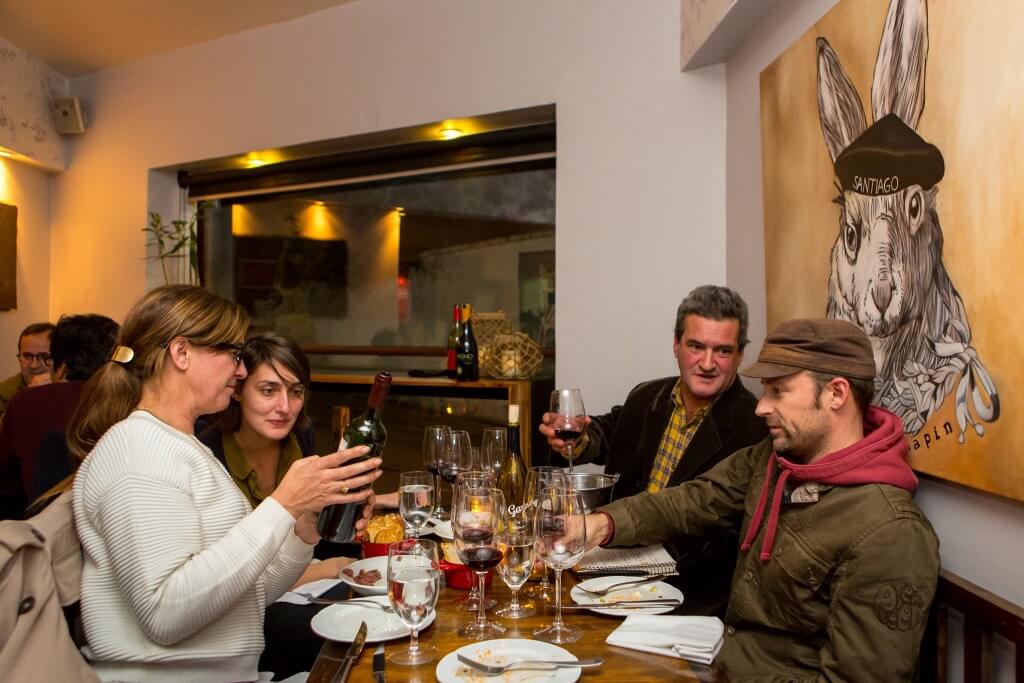
A wine pairing dinner with Derek at local restaurant, The White Rabbit.
When planning a tasting for Upscape clients, Derek says he’ll “go with a quiver of possibilities and then open different wines based on tastes.” He says, “it’s not a pairing so much as it is a way to complement the food. 99 (a restaurant where Derek receives Upscape clients for meals and wine) does some really interesting things, ice cream made out of traditionally savory ingredients, combinations of things you’re not really expecting. “The idea,” he says, “is to taste the food with people, and then choose wines. Some people like wines that are a little bigger, stronger, more mature, so we vary the styles.”
He says, “people generally take wine far too seriously.” And it would be easy to leave it at that, and look at him as a loose cannon. But it’s worth noting that beneath his seemingly irreverent exterior are several years of accolades for Garage Wine Co.’s dozen-or-so wines. This includes some newer wines from Maule that are made after years of essentially stalking certain grapes from the region. Careful, thousand-plus kilometer drives in just the right season, talking and buying wine from the locals on the side of the road coupled with asking pressing questions are part and parcel of their work. For example, a few years ago they came upon an area of goblet-trained, dry-farmed Cabernet Franc which has had great results, and happens to be Derek’s wife, Pilar Miranda’s (one of the group of three winemakers) favorite.
And while one long drive might find the aforementioned Maule Cabernet Franc, another might track down some old bush vines of País, from which they’ve made a very popular “Old Vine Pale” (similar to a rosé). Another hunt revealed a plantation of Cinsault, which Derek could tell—by the color of the leaves—had only ever been farmed with horses. That prize find will be used for a forthcoming project that has yet to be announced.
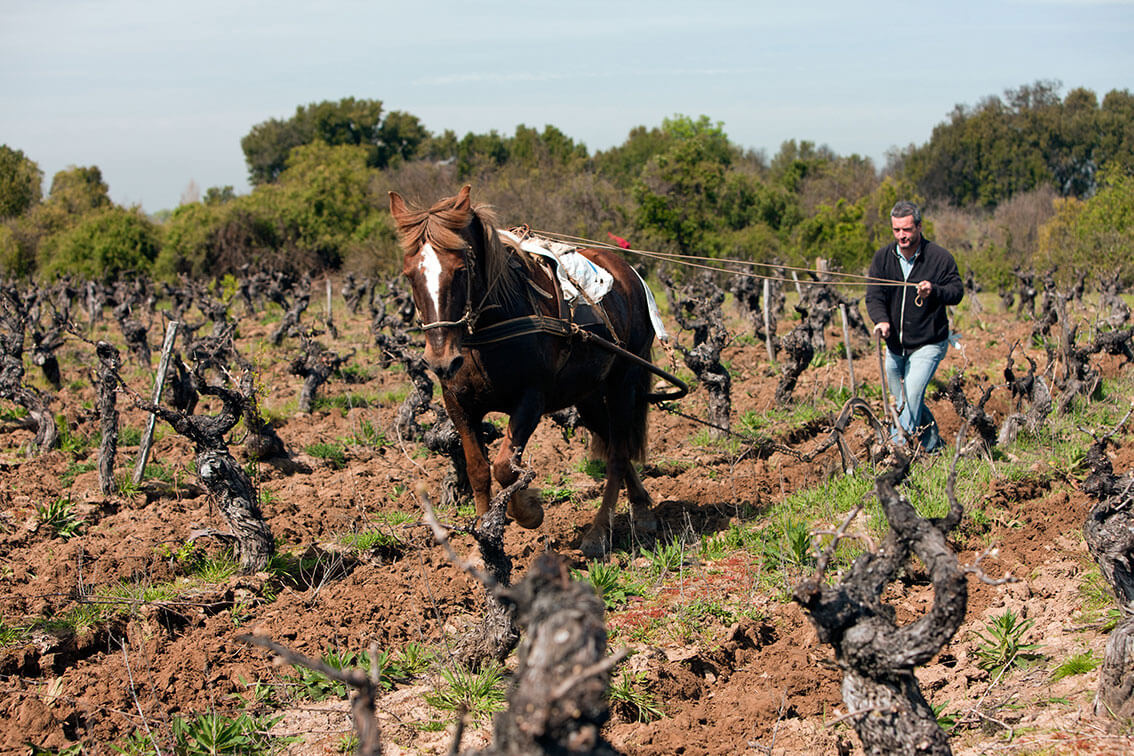
Horse farming in the Maule Valley. Photo: Matt Wilson
It’s almost as if Derek and the team at Garage Wine Co. are taking those long drives, doing these those hundreds of tastings, hand pruning, and just plain taking their own wine so seriously with one thing in mind: Making sure that when they come to taste with Derek, the only thing there is left for Upscape clients to do is enjoy.
